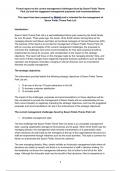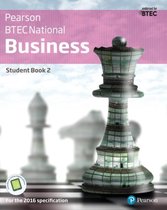Formal report on the current management challenges faced by Saxon Fields Theme
Park Ltd and the suggested management proposals and recommendations.
This report has been prepared by (Name) and is intended for the management of
Saxon Fields Theme Park Ltd:
Introduction:
Saxon Fields Theme Park Ltd is a well-established theme park owned by the Smith family
for over 50 years. Three years ago, the owner, Chris Smith retired, leaving Nina as the
managing director and Steven and Sam as functional managers of Human Resources (HR).
The purpose of this report is to provide the management of Saxon Fields Theme Park Ltd
with an overview and analysis of the current management challenges, the proposals to
overcome the challenges and some recommendations for how each proposal should be
implemented to ensure its success, with consideration to the impact on the strategic
objectives. This report will focus on the changes made by the managing director: Nina, and
how some of these changes have negatively impacted business operations such as facility
operation and employee motivation, bringing in relevant theories such as motivational
theorists and quality management.
The strategic objectives:
The information provided details the following strategic objectives of Saxon Fields Theme
Park Ltd are:
1. To be one of the top 10 tourist attractions in the UK
2. To increase customer satisfaction
3. To increase profit
The impact of the challenges, proposals and recommendations on these objectives will be
fully considered to provide the management of Saxon Fields with an understanding of how
their current situation is negatively impacting the strategic objectives, and how the suggested
proposals and recommendations can aid in the achievement of the strategic objectives.
The current management challenges faced by Saxon Fields Theme Park Ltd:
1. Unsuitable management style:
The first challenge that Saxon Fields Theme Park Ltd faces is an unsuitable management
style, causing catastrophic damage to the business and its goals. When Chris Smith was the
managing director, the management style showed characteristics of a paternalistic style,
where decisions are still made by the managers at the top of the organisational structure but
staff are empowered through initiatives such as the social activities. This style is common for
family run businesses like Saxon Fields, hence the ‘paternal’.
The new managing director, Nina, clearly exhibits an Autocratic management style where all
decisions are made by herself, and there is no involvement of staff in decision making. On
the leadership continuum for management behaviour, this is further to the left at the ‘tells’
stage. Although the Autocratic style has the benefit of fast decisions, Nina’s inexperience in
1
, the theme park industry has led to many ineffective decisions. For instance, the decisions to
remove the low cost accommodation, canteen subsidies, social activities and a reduction to
wages have all disgruntled the staff. This occurred because under the Autocratic style, the
staff’s opinions were not considered. Referencing the data tables provided, this could
provide a cause behind the significant decline in employee satisfaction which has fallen from
70% in 2018-19 to just 32% in 2022-23. This may also be the reason why labour turnover of
temporary staff has increased by 27% in the same period. Therefore, the Autocratic
management style is clearly unsuitable for Saxon Fields, as due to Nina’s inexperience
paired with the disregard for staff’s opinions, has worsened business performance.
This challenge has a negative impact on all three strategic objectives. Due to staff
satisfaction and labour turnover rising, customer satisfaction and ranking as a tourist
attraction will be worsened, as these two issues are contributing to the staff shortages
causing facilities to close during peak times. Furthermore, not consulting staff who interact
with customers on a day to day basis leads to ineffective decision making as Nina and other
managers will have a limited view on what customers need and want. Ineffective decisions
and high labour turnover negatively impacts the ‘to increase profit’ objective as costs
associated with poor decisions and additional recruitment (to fill vacancies caused by the
labour turnover) reduce profit.
2. Lack of motivation:
Another critical challenge that the management of Saxon Fields faces, is the lack of
employee motivation. A motivated workforce is crucial to the success of a business in
completing its strategic objectives, as motivated staff will take pride in their work, and ensure
that they provide customers with an exceptional experience. However, recent changes have
gone against what motivational theorists recommend such as Maslow’s Hierarchy of Needs
and Herzberg’s Two Factor Theory. Maslow’s Hierarchy of Needs suggests there are five
levels of needs that need to be met in order to have a fully motivated workforce:
physiological (basic needs), safety (job security and good working conditions), social (good
relationships), esteem (recognition for hard work) and self-actualisation (achieved when the
four lower levels are met).
Nina’s recent decisions clearly go against Maslow’s Hierarchy. For example, the removal of
low cost accommodation and canteen subsidies has damaged the physiological tier. The rise
in faults for the theme park rides due to less inspections and maintenance means staff are
working around faulty equipment, likely making them feel less safe. The implementation of
zero hour contracts, where there is no minimum guarantee of hours, reduces income and job
security, further damaging the safety tier. And the removal of social activities has damaged
the social tier as staff do not have the same opportunities to build strong interpersonal
relationships with their colleagues as before. The removal of social activities and
implementation of zero hour contracts also links to Herzberg’s hygiene factor as job security
and a good working environment is not present at Saxon Fields anymore. Notably, in Steven
and Sam’s visit to another UK theme park, they found that the theme park had implemented
a Great Work award. This is an initiative that meets the esteem tier, because staff’s hard
work is recognised and rewarded.
2





